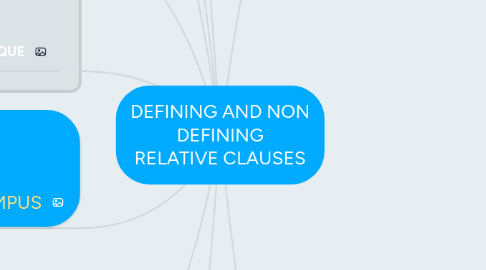
1. RELATIVE CLAUSES
1.1. A relative clause gives more information about someone or something referred to in a main clause. Some relative clauses (defining relative clauses) are used to specify which person or thing we mean, or which type of person or thing we mean:
1.1.1. The couple who live next to us have sixteen grandchildren
1.1.2. Andrew stopped the police car that was driving past.
1.2. Notice that we don't put a comma between the noun and a defining relative clause. Relative clauses begin with a relative pronoun: a wh- word (who, which, etc.) or that. However, sometimes we omit the wh- word I that and use a zero relative pronoun:
1.2.1. We went to a restaurant (which/that) Jane had recommended to
2. We use that as subject after something and anything; words such as all, little, much, and none used as nouns; and superlatives. (Which is also used as subject after something and anything, but less commonly.)
2.1. We use that or zero relative pronoun as object after these:
2.1.1. These walls are all that remain of the city, (not ...all which remain...)
3. DEFINING RELATIVE CLAUSE
3.1. When we use a defining relative clause, the relative pronoun can be the subject or the object of the clause.
3.1.1. In the following sentences the relative pronoun is the subject. Notice that the verb follows the relative
3.1.1.1. • Rockall is an uninhabited island which/that lies north west of mainland Scotland.
3.2. In the following sentences the relative pronoun is the object. Notice that there is a noun (or pronoun) between the relative pronoun and the verb in the relative clause.
3.2.1. In this case, we can use a zero relative pronoun:
3.2.1.1. • He showed me the rocks (which/that) he had brought back from Australia.
4. We can also use whom instead of who as object, although whom is very formal:
4.1. • She's an actress whom most people think is at the peak of her career.
5. PUCE - SI ING. VANESSA PALOMEQUE
6. PONTIFICAL CATHOLIC UNIVERSITY IBARRA CAMPUS
7. Video Relative Clauses
7.1. Relative Clauses 1
7.2. Relative Clauses 2
7.3. Relative Clauses 3
7.4. Relative Clauses 4
8. Exercises
8.1. Relative Pronouns Exercises 2
8.2. Relative Pronouns (who / which / whose)
8.3. Defining relative clauses
9. USE OF WHOSE, WHOM, WHERE, WHEN, etc.
9.1. When we use a non-defining relative clause to add information about a person or people:
9.1.1. • We use who as the subject of the clause
9.1.1.1. One of the people arrested was Mary Arundel, who is a member of the local council.
9.2. • We use who or whom as the object of the clause, although whom is more formal and rarely used in spoken English:
9.2.1. Professor Johnson, who(m) I have long admired, is to visit the university next week.
9.3. When we use a non-defining relative clause to add information about a thing or group of things, we use which as the subject or object of the clause:
9.3.1. • These drugs, which are used to treat stomach ulcers, have been withdrawn from sale.
9.3.2. • That Masters course, which I took in 1990, is no longer taught at the college.
9.3.3. That is sometimes used instead of which, but some people think this is incorrect, so it is probably safer not to use it. We also use which to refer to the whole situation talked about in the sentence outside the relative clause:
9.3.3.1. • The book won't be published until next year, which is disappointing.
9.3.3.2. • I have to go to hospital on Monday, which means I won't be able to see you
9.4. Some relative clauses are used to add extra information about a noun, but this information is not necessary to explain which person or thing we mean:
9.4.1. • Valerie Polkoff, who has died aged 90, escaped from Russia with her family in 1917.
9.4.2. • We received an offer of £80, 000 for the house, which we accepted.
9.5. We can also use whose in a non-defining relative clause:
9.5.1. • Neil Adams, whose parents are both teachers, won first prize in the competition.
9.5.2. Notice that we don't use zero relative pronoun in a non-defining relative clause.
10. USE OF PREPOSITIONS WITH RELATIVE CLAUSES
10.1. In formal styles we often put a preposition before the relative pronouns which and whom
10.1.1. • The rate at which a material heats up depends on its chemical composition.
10.1.2. • In the novel by Peters, on which the film is based, the main character is a teenager.
10.1.3. • An actor with whom Gelson had previously worked contacted him about the role.
10.1.4. • Her many friends, among whom I like to be considered, gave her encouragement.
10.2. Relative pronoun:
10.2.1. • Is it right that politicians should make important decisions without consulting the public to whom they are accountable? (not ...the public to who they are accountable.)
10.2.2. • The valley in which the town lies is heavily polluted, (not The valley in that the town...)
10.3. Use of which rather than whose to talk about things:
10.3.1. • A huge amount of oil was spilled, the effects of which are still being felt, (or ...whose effects are still being felt.)
10.3.2. • The end of the war, the anniversary of which is on the 16th of November, will be commemorated in cities throughout the country, (or ..whose anniversary is on...)
